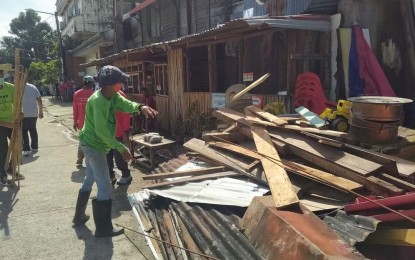
ENCROACHMENT. A roadside clearing activity in Tacloban City in this undated photo. The Eastern Visayas Regional Development Council has formed a technical working group to address the concerns of informal settlers along national highways in the region. (Photo courtesy of Tacloban city engineering office)
TACLOBAN CITY – The Eastern Visayas Regional Development Council (RDC) has formed a technical working group (TWG) to address the concerns of informal settlers along national highways.
National Economic Development Authority (NEDA) Regional Director and RDC vice chair Meylene Rosales said on Tuesday the TWG had its first meeting on June 21 and will meet regularly to find ways to address the encroachment of houses on roadsides.
The TWG on the resettlement of informal settlers along national highways (RISeNH) is chaired by the Department of Human Settlements and Urban Development (DHSUD) as chairperson and the Department of Public Works and Highways (DPWH) as co-chairperson and secretariat.
“Addressing the issue of informal settlers in the region is not an easy job, but not an impossible undertaking with the continued commitment and active support and contributions of all sectors concerned,” Rosales said in a phone interview.
The TWG came up with an action plan that spells out the specific actions, timeline, responsible agencies, or local government units, among others, to carry out necessary resettlement interventions relative to illegal occupants along national highways in the region.
Based on the preliminary data from the DPWH, the agency has identified 72,916 illegal structures along the national highway in the region.
Between 2016 and 2021, DPWH was only able to remove more than 25,000 illegal structures, meaning more than 46,000 remain along national highways.
The DPWH has no data as to how many of these illegal structures are houses.
The existing law prohibits building any structure within 10 meters from the center of the national highway for easier implementation of road expansion projects.
The need to address the issue of informal settlers is a commitment of the country under the Sustainable Development Goals 11, or the promotion of access for all to adequate, safe, and affordable housing and basic services and upgrade slums, and provide access to safe, affordable, accessible and sustainable transport systems for all, among others.
It is also in compliance with various relevant Philippine governing laws for the homeless and the welfare of the public in general.
The TWG on RISeNH has alternate members from NEDA, National Housing Authority, Department of the Interior and Local Government, Department of Environment and Natural Resources, Environmental Management Bureau, Social Housing Financing Corporation, and Home Development Mutual Fund. (PNA)
